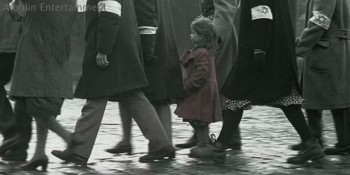Russian figure skater Yulia Lipnitskaia is taking the 2014 Winter Olympics by storm. At 15 years of age, she has positioned herself as a favorite for the gold medal in this year’s ladies’ singles free skate competition, and she seems poised to be the greatest female figure skater in the world through at least the 2018 Games.
Today, in the ladies’ free portion of the team event, making its debut in Sochi, Russia, Lipnitskaia took the ice in a brave and provocative performance. As Russian president Vladimir Putin settled into his seat in the Iceberg Skating Palace, Lipnitskaia stood at center ice, clad in a red leotard while the strains of John Williams‘ score to Schindler’s List came to life.
Steven Spielberg’s 1993 historical drama tells the story of Oskar Schindler, a German man who saved more than 1,000 Polish Jews from execution in the Holocaust. The film is presented nearly entirely in black-and-white, and one splash of color creates a stark image: the red coat of a young girl as she tries to hide from the Nazis who are “liquidating” the Jews of the Kraków ghetto. Later, Schindler sees a body clad in a red coat among a wagon of dead bodies being carted off for disposal.
Not everyone is impressed with Lipnitskaia’s performance choice. Critics pan the idea that the suffering of the Jews during the Holocaust should be “trivialized” in a figure skating routine. That is the wrong perspective.
Lipnitskaia’s choice to portray that girl on the ice today is a bold statement that echoes the fundamental principles of the Olympic Games, namely that “[t]he goal of Olympism is to place sport at the service of the harmonious development of humankind, with a view to promoting a peaceful society concerned with the preservation of human dignity.” The girl in red also challenges the leader of her country, directly to his face, to reconcile the Russian president’s desire to host these Games with his disregard for human rights.
It is true that the Soviet Union fought against Nazi Germany in World War II; the USSR was not complicit in the Holocaust. Nonetheless, the hands of the Russian Empire are not free of the blood of genocide.
The policies of Soviet leader Joseph Stalin created a famine that killed millions in Ukraine in 1932 and 1933. Today, Ukraine is still fighting to exorcise the ghost of the long Soviet presence in its borders as the nation determines its identity in a new Europe.
In fact, Sochi itself may have been the site of the first modern European genocide: beginning in 1859, Russian emperor Alexander II engaged in a campaign to relocate the Circassians by massacring the North Caucasians in their native villages.
While the act was not perpetrated by the Russian government, the Caucasus Mountains were also the setting for the mass killing of Armenians by the Ottoman Turks in 1915. Even today, the Caucasus is a hotbed of separatist movement and brutal government crackdowns. The terror threat at the 2014 Games is directly connected to the unrest in this region, including Chechnya, at the edges of Moscow’s grasp. The 2013 Boston Marathon bombing suspects had ties to radical Islam in the Russian republic of Dagestan. This unrest underlines the sense throughout the region that oppression has been a way of life for centuries.
The socio-cultural focus of these Games from the American perspective has been on Russia’s ban on “homosexual propaganda.” Putin himself has said the nation must be “cleansed” of homosexuality. That language is chilling, and one can only hope this is a subpar translation of Putin’s Russian. If it is not, the global community must be on alert and be ready to take action.
All of these elements make the decision of the International Olympic Committee to award the 2014 Olympics to Russia difficult to understand. The IOC seems to pay lip service to the supremacy of human rights while granting financial reward and international prestige to a government that has not valued those very same rights.
The Olympics judges at the Iceberg are equipped to struggle with assessing the technical skill and artistic beauty of Lipnitskaia’s skating. And at 15, Lipnitskaia may not even comprehend the full weight of her performance. But it is the duty of the rest of us, the viewers of these Games, to recognize the moment of reflection that has been created by Lipnitskaia and her team to portray such a stark moment in such a vital film.
Kraków, Poland, is one of five applicant cities to host the 2022 Winter Games. If Kraków, a city that has overcome such a terrible chapter in human history, should be awarded the Games, the IOC will have presented an opportunity to showcase the triumph of the human spirit instead of shilling for a regime that does not demonstrate a concern for the very principles on which the Games were founded.
Here’s hoping the IOC has the wisdom to make as powerful a statement then as Lipnitskaia did today.
